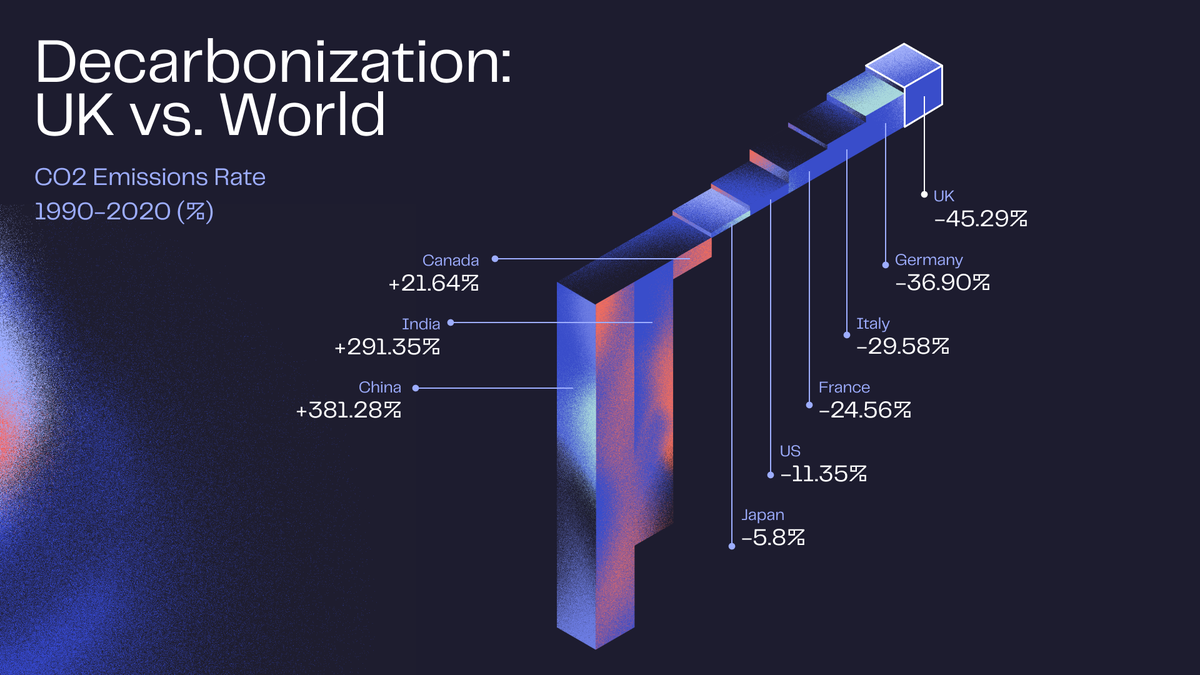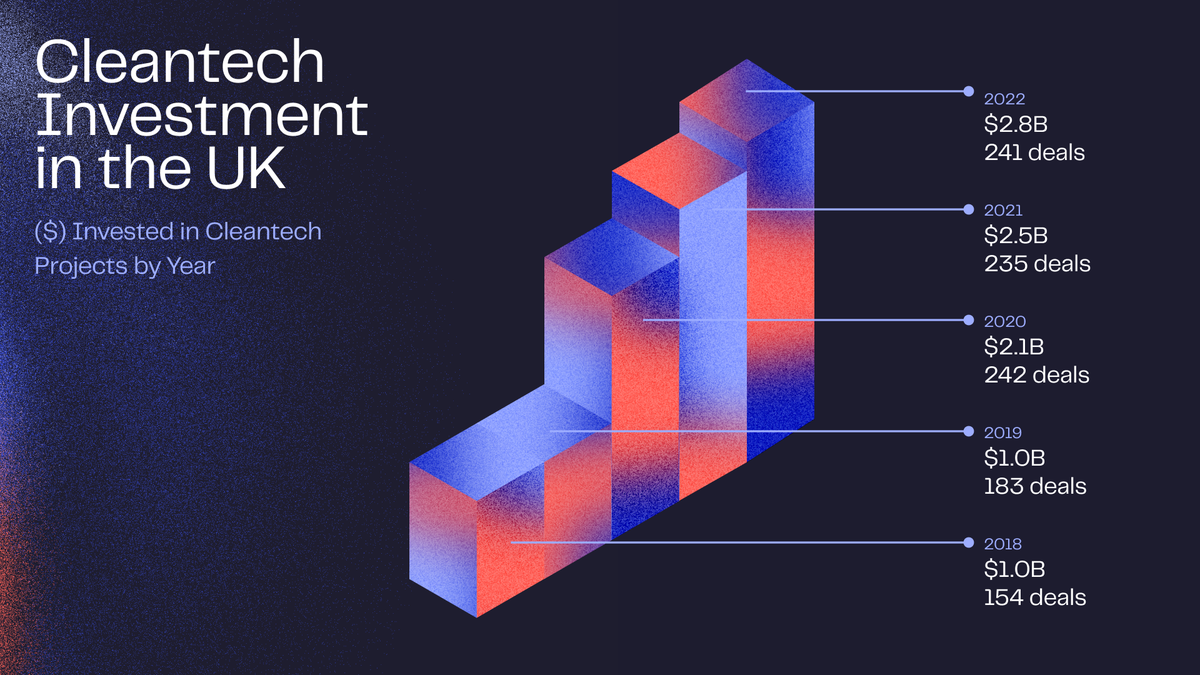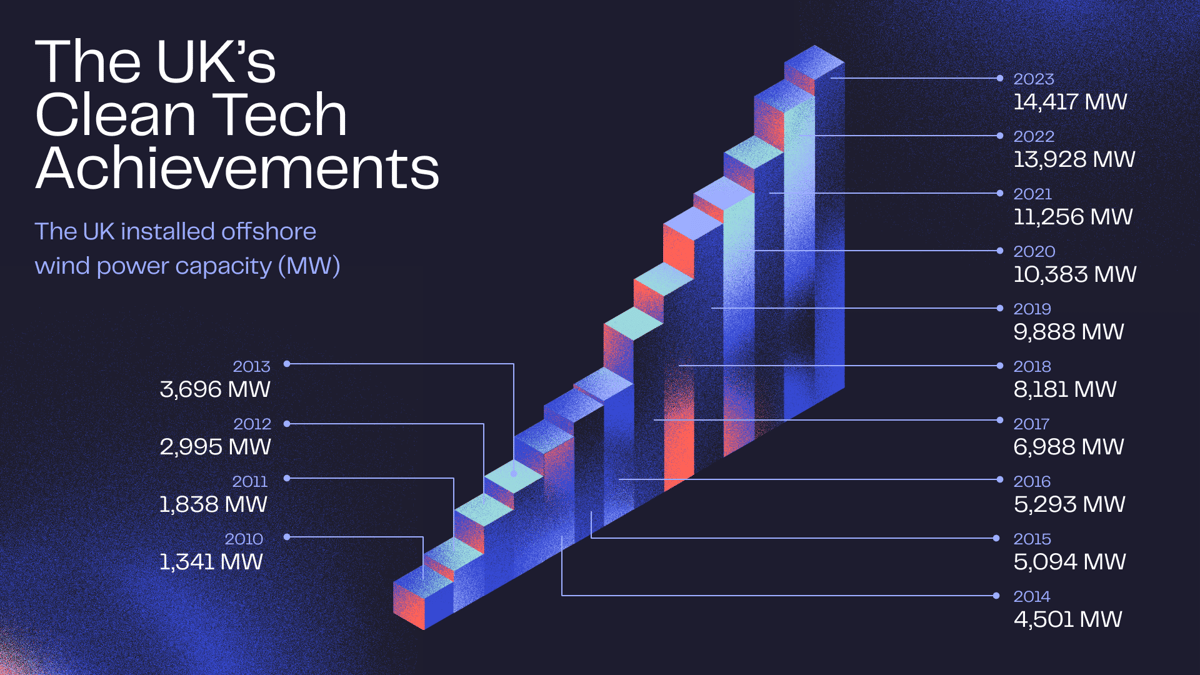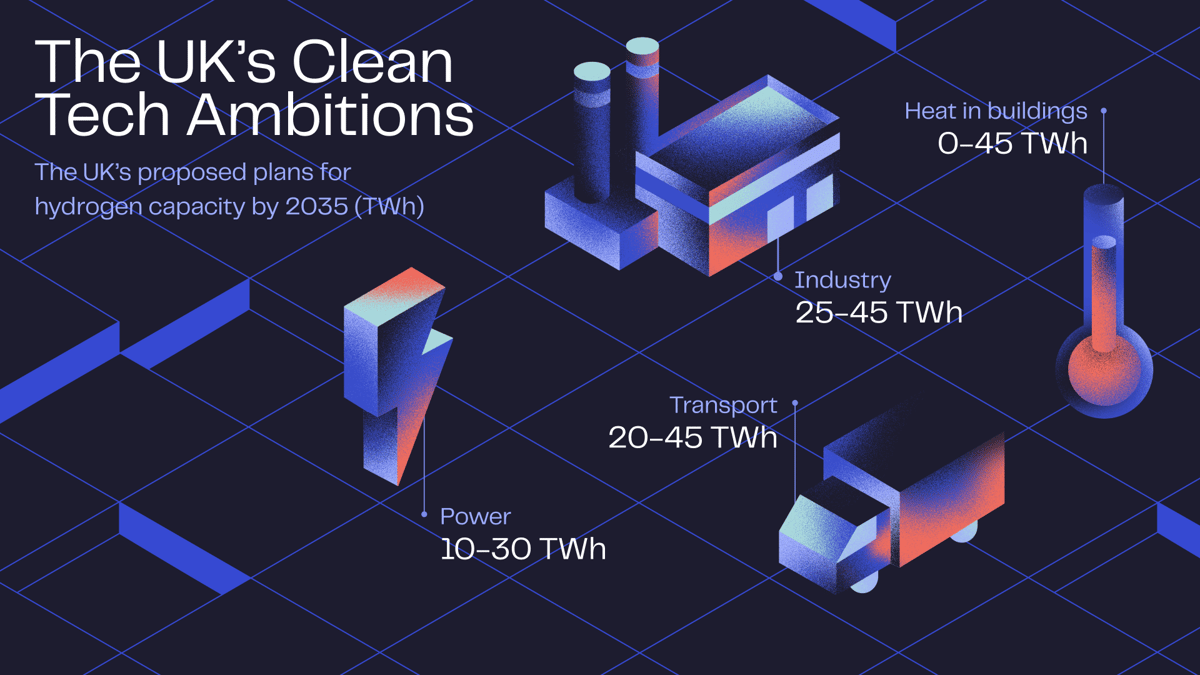
How the UK Is Helping Other Nations in the Race to Net Zero
UK firms are exporting clean technology knowledge around the world.
The race is on to save the world from climate change, and the Asia Pacific region—which counts on fossil fuels for 85% of its energy consumption—could really use a head start. “The extent to which Asia Pacific decarbonizes will make or break the global fight against climate change,” says Martin Kent, His Majesty’s Trade Commissioner for Asia Pacific. “The UK is ready to share our world-leading expertise in clean technologies, and many UK companies are already partnering with Asia Pacific to shift the dial in the region.”
That is just what Japan is getting from Mott MacDonald, a UK-based engineering consultancy that is involved in four out of five of Japan’s first offshore wind farms.
The UK government set in law the world’s most ambitious climate change target, cutting emissions by 78% by 2035 compared to 1990 levels.
Offshore wind in the Asia-Pacific region “is a relatively immature industry,” says Singapore-based David Boyland, Managing Director for ASEAN and East Asia at Mott MacDonald. But with the experience the company has developed building offshore wind farms in the UK and elsewhere, “We can hit the ground running,” he says. “Instead of having two or three wind turbines go out, we’re delivering 300 or 400 MW wind farms straight off the bat, which took years, if not a decade, to deliver in the UK.”

In recent years, the UK has rapidly reduced its dependence on coal while increasing its share of electricity generated from wind, solar and nuclear power. The UK hosts the world’s largest offshore wind farm, and wind recently became the country’s largest single source of installed power capacity. With a view of unlocking future technologies, the UK’s Net Zero Investment Roadmap also has ambitious plans for harnessing hydrogen power, as well as deploying carbon capture technology that will store up to 450 million metric tons of CO2 by 2035.
The island nation has rapidly built an ecosystem of startups and scaleups working in all areas of clean growth, and the UK’s clean-growth leadership goes well beyond technology. Some of its greatest innovations have been in the structures and processes that allow massive projects to get off the ground quickly.
“The scale of the clean energy transition that is required both domestically and globally is just of a magnitude greater than seen in other sectors,” Boyland says. “And Britain is a leader in enterprise project delivery models for large-scale infrastructure development.”

Britain has a proud history of engineering leadership, from the steam engine and power loom to the World Wide Web and the first bionic hand. When offering its services to Asian clients, Mott MacDonald can point to its participation in the futuristic new Elizabeth Line subway now running under London, as well as its involvement in dozens of renewable energy projects in more than 60 countries worldwide. The company’s Renewable Energy Academy, in Thailand, has provided specialized training to more than 150 staff throughout the Asia Pacific region over the past five years.
The UK has shown leadership in renewable energy through its donation of public space for projects, its regulatory systems to incentivize development, its creation of new investment vehicles and its incorporation of ethical and social frameworks into project planning.
Britain started developing utility-scale solar plants nearly a decade ago, notes Peregrine Fraser, CCO of Above Surveying, a UK-based firm that offers aerial mapping, inspection and maintenance technology for solar plants. The company provides solar technology to Japanese projects funded by large institutional investors, which retain top-flight law and technical advisory firms and demand rigorous engineering specifications and financial modeling. The resulting commercial contracts and special-purpose vehicle structures have become global models for developers seeking “bankable” projects, says Fraser.
“Some of these standards were established in Britain because institutional investors demanded them,” says Fraser. “We understand these contracts and know how to fulfill their technical requirements to build and maintain a solar plant.”
HM Trade Commissioner for Asia Pacific Martin Kent notes that eight of 10 of the members of the Association of Southeast Asian Nations have committed to reaching Net Zero by mid-century. “The challenge now is implementation,” he says. “It’s vital for donors like ourselves to develop ways to work together and mobilize private capital.”
He points to the Just Energy Transition Partnerships as a way the UK is “sharing our world-leading UK regulatory experience of private capital investment driving the energy transition.” Indonesia was the second country to launch one of these COP26-pioneered partnerships, in which billions of donor dollars is matched with private finance for decarbonization projects and the regulatory changes needed to replace coal with clean energy.
The UK is also sharing its finance and infrastructure development experience through the ASEAN Sustainable Leadership in Infrastructure Program, an executive leadership program aimed at helping Southeast Asian government agencies analyze bids and create more sustainable and efficient infrastructure.

The UK government’s export finance program can unlock attractive financing terms for overseas buyers of British renewable and cleantech exports. Overseas buyers can access financing in more than 60 pre-approved local currencies. In the Asia Pacific region, the financing program has provided $600 million for three offshore wind projects since 2019.
The UK’s commitment to clean growth is supported by a thriving business ecosystem. UK cleantech investment reached record highs in 2022—nearly triple the figure from 2018—despite a cooling in the venture capital climate, according to clean technology consortium Cleantech Group. Tech Nation’s 2022 Climate Tech Report found that the UK is second only to the United States for the number of climate tech startups and scaleups, with over 5,200 climate tech pioneers operating in the sector.
“The UK cleantech ecosystem is strong and receives more investment than any other country in Europe,” notes Martin.
Clean technology is just part of the UK’s innovation story. The UK’s startup ecosystem ranks third globally in terms of venture capital raised, behind only the US and China, according to Dealroom, a tech ecosystem data provider. With around 160 unicorns (billion-dollar-plus companies) already created, and more than 200 potential unicorns, the UK has “by far Europe’s biggest startup ecosystem,” according to Dealroom.
Many of these growing companies offer their services for export. Above Surveying, based in Colchester, near England’s east coast, has worked with clients in Australia, Vietnam and Japan, where it is helping solar operators use autonomous drones to inspect and maintain large plants with less human labor. “British firms are pioneering in autonomous drones and in partnerships with the solar industry,” says Fraser. “In some countries, the majority of operating costs for managing solar plants are personnel and site visits, so this could be a game changer.”
In its early years, Above Surveying received anchor funding from the UK’s Clean Growth Fund and research funding from Innovate UK, the nation’s innovation agency. The company’s headquarters is on the campus of the University of Essex, and it frequently hires from the school and has engaged in several knowledge-transfer partnerships. “We’re very much part of the ecosystem,” Fraser says. “You can say we’re evidence that the government’s industrial policy has worked.”

Octopus Energy is one of the biggest clean-growth success stories to emerge from the UK ecosystem. Founded just seven years ago, Octopus already powers more than 5 million UK homes with 100% green electricity. Octopus does everything from building wind and solar farms to installing heat pumps and EV chargers, but its secret sauce—and export hit—is Kraken, the software platform on which its services are built.
Kraken has helped Octopus implement popular innovations like smart tariffs for customers with EVs or solar panels, and discounts for customers living near wind turbines. It is also the backbone of Octopus’s highly rated customer service operation. Kraken is already licensed to major energy companies and utilities in 16 countries, accounting for over 30 million customer accounts. Major partners in Asia Pacific include Tokyo Gas and Australia’s Origin Energy, which Octopus reports has achieved $170 million in savings in under two years after migrating its customers to the platform.

“There’s an incredible amount of technical expertise, development experience, industry knowledge and talent around offshore wind, heat pumps and digital energy tech in the UK,” says Rebecca Dibb-Simkin, Chief Product Officer at Octopus Energy. “The country has laid the foundations to become a clean tech net exporter. And with the right frameworks in place, British companies will be able to move and innovate even faster, bringing world-leading tech to even more people around the world.”
